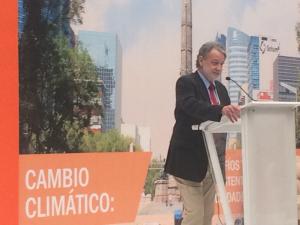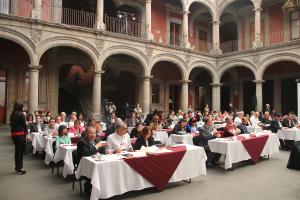Event reports
Click here to access a documentary about the event available on YouTube.
In 2025, 2/3 of the world population will be living in cities, which account for 75% of global energy consumption and 80% of CO2 emissions. These data were emphasized in the welcome speech given by the Representative of theEnvironment Secretary – GDF, evidencing the important role of all cities to fight against climate changes. Dr. Christian Hübner, Head of KAS Regional Programme Energy Security and Climate Change in Latin America, presented the KAS work on these subjects.
Mexican General Law on Climate Change, issued on 2012, proposed the creation of the National Institute of Ecology and Climate Change – INECC, a “think tank” dedicated to national environmental policies. One of its six main subjects is sustainable cities, which is a cross subject of the different investigation areas of this Institute, as stated by the INECC Representative. Juliana Lopes and Andreia Banhe, CDP Representatives, informed the audience about the CDP Platform, a system for disclosure of cities greenhouse gas emissions and their action plans for mitigation. CDP has developed an innovating system to report environmental activities of different cities, including data from companies that list their shares at the stock market. 207 cities already reported their gas emissions and action plans through CDP Platform in 2014. More than 90 Mexican cities have been invited to participate in this system in 2015.
At the first round table, a case study on opportunities for mitigation of greenhouse gas emissions in sustainable cities was presented. Oscar Vásquez, Director of Climate Change and MDL Projects of Mexico City, stated that the Metrobus is a successful example of bonus and carbons sales with incomes of almost one million of Euros. He emphasized the Local Climate Action Strategy for 2014-2020, which defines the strategic subjects and action plans of the projects. This strategy was proposed in consultation with ONGs, enterprises and consultants, and its goal is to improve quality of life and to obtain an environmentally friendly development. Environmental activities do not have to be opposed to financial activities. According to Alejandro Leal Espinoza, Director of Ecology and Public Cleaning of San Luis de Potosí, a city which is strategic for transportation routes and logistic activities in Mexico, the instruments for decision-making, such as gas emissions inventories are very important. They identify the main sources of such emissions (transportation, electric energy, cattle emissions and fertilizers) and allow governments to make conscious political decisions. Gabriel Navarro Guerrero, Secretary of Urban Development and Sustainability of Puebla City Local Government, informed that the Development Programme of this city started seven years ago, and climate change is accepted as an economic matter (related to resources saving). Puebla city participates of the World Bank pilot programme TRACE (one year diagnosis, 24 cities around the world). In 2016 Puebla will host the Smart City Expo, the first in Latin America.
Nelson Moreira Franco, Climate Change Manager of Rio de Janeiro, presented the CB27, a Brazilian platform to exchange information among the environmental representatives of the 27 Brazilian capitals. Dealing with the problems of the climate crisis should be part of dealing with the current financial crisis. Global warming is a human responsibility, an ethical and moral problem. Rio de Janeiro has already issued 3 inventories, allowing comparative data to be obtained. Transportation is responsible for 30% of greenhouse gas emissions, and waste is responsible for 11%. These inventories are used to compare results with other cities in the world, and this is why the unification of methodology (GHG Protocol) is so important. The verification of the inventory by a third party allowed it to obtain the UN official recognition. Mr. Moreira emphasized the importance of institutional networks for the exchange of experiences, such as the CB27, which was created during the Rio+20, and the Water and Cities Alliance, signed by the representatives of Mexico city, Rio de Janeiro and Bogota at the COP20.
During the second round table, economic opportunities and politic incentives to achieve a sustanable economy were discussed. Francisco Suárez, Corporative Affairs Director of Coca-Cola FEMSA introduced some examples of public-private cooperation for controlled use of resources, such as water, in production processes. Juan Carlos Camargo, Walmart Division Manager of Sustainability talked about the automotive manufacturing and the need of water in its process. Aguas Calientes Plant is currently using less water, in accordance to its Business Global Plan. He stated that they have developed the first 100% electric car and that they are working in cooperation with different governments. Richard Shackleton FCO talked about the importance of cooperation, not only at the international level, since local governments also have to lead actions. He talked about projects conceived to cause an impact in public policies, as the Carbon Platform with the Mexican Stock Market and the Green Bonds Market. World Bank Representative, Alejandra Ortiz, stated that there are resources available for adaptation and mitigation city projects, such as projects of energy efficiency, solar energy, transportation and public services. Nevertheless she pointed out the importance of reduction of waste production.
Alberto Cárdenas, Legislator of the opposition party in the local government of Guadalajara city, stated that governments must allow for private sector actions. In Guadalajara the city is paying 20% less for energy because it is bought from a private company. A tender for the buying of 40,000 spotlights has been approved and there is no cost increase for the local government because it is going to be paid by energy saving. About the costs of waste management, they want to make a complete recycling cluster with the private sector support.
Cities are recognized by the ONU in their leading roles on climate change and, in Mexico, cities have advanced the topic with concrete and innovative actions.






